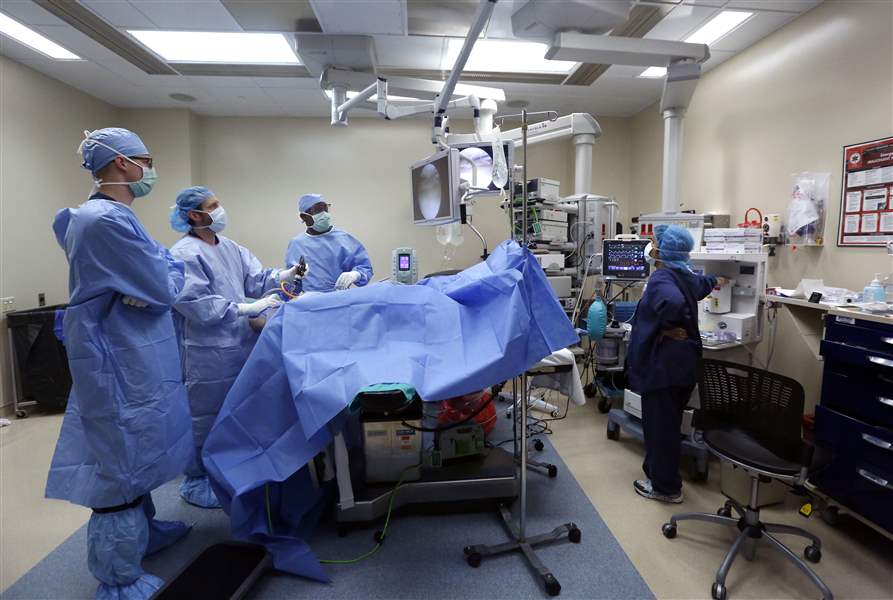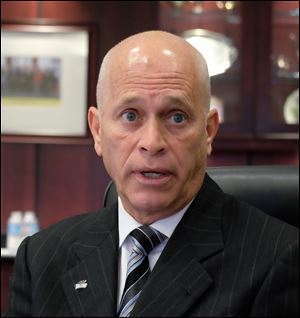
Illin’ in the O.R.
Local doctors say music can be beneficial during surgery
4/21/2018
Dr. Jason Levine, center, Dr. Ryan Bray, left, and Marcus Sanders, right, certified surgical technician, listen to the Beastie Boys while performing knee surgery at Toledo Clinic on April 13.
The Blade/Amy E. Voigt
Buy This Image
Music is inescapable.
It can be found in concert halls and homes, in cars and in classrooms, and to many ears, in the symphony of nature.
And though you may not know it at the time, it can even be found in operating rooms around the country, including surgical suites at Toledo Clinic, where Dr. Jason Levine, an orthopedic and sport medicine surgeon, can be found conducting a routine knee operation to the scratchy vocals of Kurt Cobain or crashing symbols of Metallica drummer Lars Ulrich.
“It’s not a distraction at all,” Dr. Levine said. “When I operate and there’s no music going on in the operating room, to me that’s more uncomfortable. The silence to me is actually kind of awkward.”
The strains of Nirvana, Metallica, the Beastie Boys, Pearl Jam, Guns N’ Roses, and The Smashing Pumpkins are familiar to Dr. Levine’s surgical team thanks to his favorite XM radio stations such as Lithium or AltNation.
VIDEO: Dr. Jason Levine
The obvious question is whether music played in the operating room can have positive effects, improving both efficiency and quality of tasks, an issue addressed in the article “Music in the Operating Room: ‘Can You Hear Me Now?’” from the Aesthetic Surgery Journal of the Oxford Academic.
The article argues that while high-volume music and cell phones may be a distraction for some in the operating room, evidence suggests that familiar music can also help doctors with speed and accuracy when performing surgical tasks.
Dr. Levine said he “definitely perks up” whenever a song by the Beastie Boys comes on the radio during surgery because of the group’s influence on him while growing up. He said he knows every song from the band’s 1986 album Licensed To Ill.
Despite the band’s tendency toward aggression or angst, he said the songs are calming because they remind him of fonder times, including going to concerts or working out in the weight room when he played high school football.
“It gives me happy memories and just kind of relaxes me,” Dr. Levine said.
The physician performs 12 to 15 surgeries a week, from a 30-minute knee arthroscopy to a two-hour total knee replacement. He said the radio is always playing in his operating room.
“When I do a total knee replacement that has many, many steps and has a lot of stuff going on, we’re able to all stay focused on what’s going on in the surgery and in the background have the music,” he explained. “The operating room can be a pretty intimidating environment for people that either aren’t used to it or aren’t used to working with me. Having music that everyone likes playing on the radio, it kind of relaxes everybody.”

Dr. F. Charles Brunicardi
Many other surgeons also welcome music into their operating rooms, whether it suits their own tastes or that of their nurses, as is the case with Dr. F. Charles Brunicardi, chair of surgery in the College of Medicine and Life Sciences at the University of Toledo Health Science Campus, the former Medical College of Ohio.
As long as it’s something soft, he’s quick to add.
A musician himself who was nominated for a Pultizer Prize for his 2014 album Where Sunset Meets The Beach, Dr. Brunicardi performed his first concert at age 8 to a crowd of 1,000 people in New Jersey. He continued playing music and found himself headlining the Cambridge Folk Festival in England in 1978 and signed to Charisma Records.
He was always inspired by John Lennon. Ironically, Dr. Brunicardi was living in an apartment four blocks from where Lennon was shot and killed in New York City on Dec. 8, 1980, and Lennon’s death changed his life.
“My brother and I went there that night,” he recalled. “About 1,000 people were outside the Dakota. ... From that moment I decided I didn’t want to do professional [music for a living]. I was right there. ... I knew all of his music and he influenced me heavily with his music.
“I just made a decision that life in rock and roll was not a good life to have; my calling was in medicine, and that’s what I decided.”
Although Dr. Brunicardi doesn’t perform as many surgeries as he once did, when he does, the sounds of James Taylor and Joni Mitchell will most likely be played in his operating room.
His initial love for music never ceased.
“I want to create an operating room environment in which everybody is calm, everyone is empowered,” he said. “It’s a collaborative style of leadership, and music adds to that ambiance, to that effect.”
Dr. Matthew Currie, a board-certified specialist in comprehensive eye care for the Toledo Clinic, recalled listening to country music in the operating room during his residency in St. Louis. Though not a fan of country, the feeling of the genre has been a part of his technique since the beginning.
“Silence in the operating room tends to be tense, or at least I sense it that way,” Dr. Currie said. “I find it soothing and familiar and comfortable. Country music sits in the background very nicely.”
Dr. Levine said communication is critical among his team, which usually includes an anesthesiologist, circulator, scrub technician, nurse practicioner, and, occasionally, a resident. His operating room is often loud because orthopedic surgery requires saws, drills, and mallets.
“[The music] can’t be so loud that the scrub tech can’t hear when I’m asking for an instrument or if I need something the circulating nurse can’t hear what I’m asking for. But it’s also probably loud enough that you need to raise your voice a little bit.”
For all its entertainment value, Dr. Levine said that’s not the point of music during surgery.
“If I did a two-hour surgery and all those songs played, at the end of the surgery when I actually walk out of the operating room, if someone told me, ‘Give me five songs that you listened to while you were doing your surgery,’ I probably couldn’t tell you what was playing,” he said. “I’m very focused in on the surgery. The music in the background makes me in a good mood.”
The majority of Dr. Levine’s surgeries include his patients under general anesthesia, yet for minor procedures such as carpal tunnel or trigger finger surgery, patients are under local anesthesia. In those situations, he will ask his patient what kind of music relaxes them.
A 2016 statement from the American College of Surgeons said noise in the operating room can be a distraction but conceded that music, in the right circumstances, may be relaxing.
Dr. David Heidt, an assistant professor of surgery in the College of Medicine and Life Sciences at UT who specializes in general surgery, surgical oncology, and trauma surgery, said earlier in his career he played music during surgery.
That’s no longer the case.
“It’s distracting because I can be absorbed in it,” he admitted. “If I’m doing a big pancreatic or liver case that requires pretty constant high-level decision making, I don’t want any music on. I would rather have the room quiet.”
While in medical school, Toledo Clinic’s Dr. Levine always listened to music while studying as well as during his leisure time. It’s something he needs to factor into his work.
“It’s not a quiet thing. In orthopedics we’re making a lot of noise just with the surgery itself. There’s really no whispering,” he said with a laugh.
Contact Geoff Burns at gburns@theblade.com or 419-724-6054.